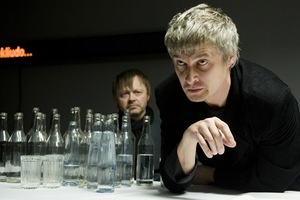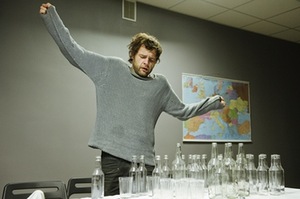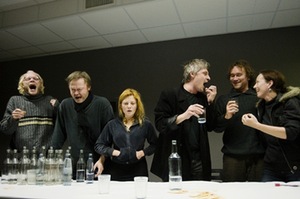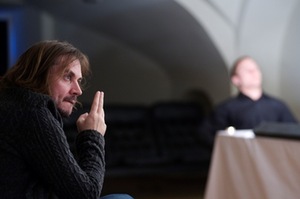'THE DEPTHS'. TILL THE SENTENCE 0
Essay
In brief: It is different every time – ‘The Lower Depths’ performance (after M. Gorky) by Oskaras Koršunovas Theatre. During this play one starts to understand theatre to be also equally created by viewers. The ‘The Lower Depths’ theatre is another model of theatre.
I lose every time when I try to watch this performance neutrally, sharply and intellectually and attempt to find out how the magic is made. When Nastyonka played by the actress Rasa Samuolytė looks at the people sitting in front of her, she breaks my heart. Or, when Satin by Dainius Gavenonis, a murderer, speaks about humanism and suddenly kicks the wall. Or, when Baron by Darius Meškauskas bursts into tears. The actor does not show it; on the contrary, he tries to suppress it turning his back to the viewers. You are outguessed, recognised and named in the hall of this theatre. There is no way back.
Jonas Verseckas, Tomas Žaibus, Darius Meškauskas, Dainius Gavenonis, Rytis Saladžius, Julius Žalakevičius, Giedrius Savickas. Darius Gumauskas. Also the wonderful women of ‘The Lower Depths’ – Rasa Samuolytė and Nelė Savičenko. And, of course, the director O. Koršunovas. And the whole team of the performance: composer Antanas Jasenka, artist Dainius Liškevičius. And property-mistress Edita, and director’s assistant Malvina, and Mindaugas, who supervises technical processes. Why am I so detailed in this? Everyone, from Simona meeting at the door of the theatre, press officer Agnė to Audra arranging tours abroad and international contacts, - all these people make one living theatre.
Why am I writing now, if the performance was awarded the Golden Cross of Stage last year already? Because ‘The Depths’ (as actors shorten it themselves) never ends. Because this play is constantly revised by the director, observing the changes – those in the world, actors and himself. A day with the performance is the day when you are different, other.
‘Read the whole ‘Depths’ by Gorky once more! – O. Koršunovas reminds before the upcoming tour. – I will read it myself. Not only the fourth act that we play but all of it. Everyone has to revive the prehistory of their role, its spirit, its way. The relationship with the Old Man must be specified – no matter he does not show up. Doread it one more time’.
Five minutes till the beginning of the performance, we are entering a small hall; they are waiting for us already. They are sitting at the long table, embraced by anxiety and fight with the demons of alcohol, fight with each other. They are sitting embraced by death already. These are the sentenced to death. They are so close to us - Satin, Nastya, Actor, Bubnov, Baron, Kleshch, Tartar, Alyoshka, Kvashnya, Medvedev. There is no polite line separating actors from viewers. No mirror. We, the viewers, become mirrors both to the characters and actors.
What can I say to a convict just before the execution? Indeed, there is no sentence in the play – just its illusion. Seemingly, those sitting at the table do not have life anymore but they still have time to think about it, to dream and to mix fantasy with reality in the palette of guilt and hope. What is everyone’s reality in ‘The Depths’? What is my own reality? How true and pure is it, how much of brutality and sin are there? What is sin? I am involved in the dialogue of reality, fantasy, pain, drunken philosophy, taunt, grievance and conscience.
If I, the viewer, am afraid of that proximity, which the director and actors provoke to, then nobody will touch me by force. If you do not want to look up, nobody will taunt you into a dialogue. Yet the dialogue itself will start to unfold in you silently. What kind of dialogue? Yes, the same: to be or not to be. So you understand who you are, so you shiver from surprise, sadness, joy or horror – is it really me?
I believe this is what Oskaras Koršunovas Theatre is being created for. On the whole – good, true theatre. To read the human nature, according Koršunovas. Not to moralise, judge or heroicize. To open. ‘Are you a human?’ – Gavenonis’s Satin asks. ‘Yes, a human, see… And I am a murderer’, - adds as if to himself. His tears of fury become your penance.
That unbeatable longing for love, nobility and light in the story of Samuolytė’s Nastyonka takes one deeper into the time of the performance and closer to oneself. Through the venturesome childishness of Žalakevičius’s Bubnov, through the passion of life of Savičenko’s Kvashnya, through the Saint Vitus dance of Savickas’s Alyoshka, through the sad eyes of Saladžius’s Medvedev floating in the drunken desert, through the Tartarian moans and desperate longing for order. Through the decision of Gumauskas’s Actor to return to the real him, the one who used to know how to say his most significant words, who would utter his ‘to be or not to be’ quietly, calmly, without hesitation. To return – through death to the Resurrection.




